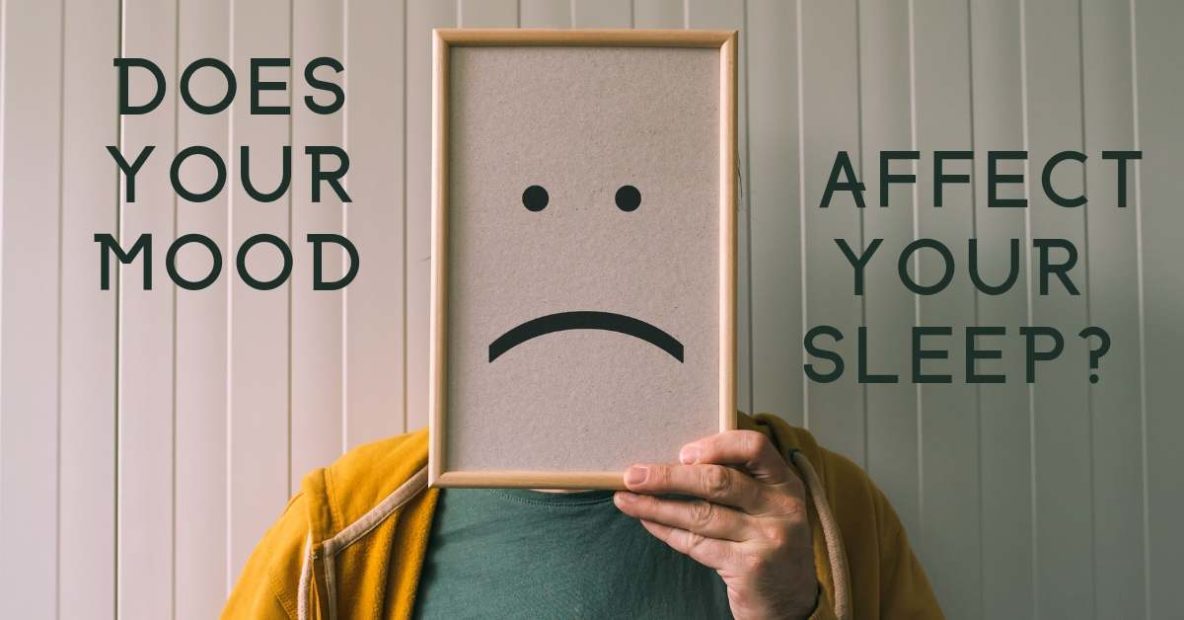Does Your Mood Affect Your Sleep?

- A Promising Paradigm Shift: New Research Challenges the CPAP-First Approach to OSA Treatment - September 5, 2023
- Understanding Sleep Meditation Techniques - July 30, 2021
- How Online Learning Has Affected Sleep for Students - July 13, 2021
One of the most common complaints when it comes to poor sleep is stress levels. If you’ve been feeling anxious about a project at work, or worried about your parent’s health, you will have a harder time falling asleep and won’t get a good night’s rest. However, the connection between mood and sleep goes both ways, and if you’re not sleeping well, you might find yourself far more stressed, or even struggling with depression. Sleep and mood go hand in hand, so it’s important that you look after both your sleep and your emotional state.
Understanding Your Brain
Your mood and your sleep are closely related, and not just because a poor night’s sleep might make you wake up feeling cranky. The chemicals in your brain that control your mood also affect your sleep, and when you’re experiencing negative emotions, the chemicals that are released into your brain to process those emotions also inhibit your sleep.
Having Trouble Turning Off
When you’re stressed, you’ll find it’s very hard to switch off. You climb into bed at the end of a long day feeling completely exhausted, but you can’t stop the flow of thoughts running through your mind. You spend an hour or more tossing and turning, and are unable to fall asleep while your worries and anxieties play on repeat. You may be able to face the day with cheerfulness in the morning, but once you’re in bed, you feel a sense of negativity, and can’t get out of this cycle of depressive or anxious thoughts that keep you awake at night. A melancholic mood also makes it harder to sleep, and those suffering from major depression often struggle to sleep at night.
Day-Time Exhaustion
Are you feeling tired during the day? Do you struggle to focus on tasks at work, or find that your mind just doesn’t want to cooperate? Day-time exhaustion can be caused by feelings of depression and anxiety, since these emotional states keep you up at night. They also cause fragmented sleep patterns, and you’ll feel fatigued during the day and unable to sleep at night. Even if you were in bed for 8 or 9 hours during the night, if you weren’t sleeping well, you’ll feel exhausted during the day. Depression also causes low energy and a lack of motivation, so your day-time exhaustion could be caused by the mood disorder itself, as well as your inability to get enough sleep.
Nightmares
Do you wake up from night terrors? We all have bad dreams from time to time, but if you’ve been waking up every night with nightmares, you may have a mood disorder like depression or anxiety, and struggle with poor sleep and a reduced quality of life. Like any cycle, the relationship between your mood and your sleep cycles is difficult to change, and the nightmares you’ve been having from your poor mood will wake you up and make it harder to fall back asleep. This exhaustion will lead to a worse day the next day, and you’ll feel emotionally drained. The next night you might have an even worse sleep, and a harder time falling asleep and staying asleep.
Looking After Your Mental Health
If you think you’re suffering from a mood disorder, and struggle with anxiety, stress, or depression, treatment is available! To break the cycle of your low mood, you need to address the issue head-on, and seek help. Talk to your doctor about your mood, and find out how you can improve your energy levels during the day.
Getting a Good Night’s Sleep
Have you been struggling to sleep? Your lack of sleep could be making you irritable and cranky, and feeding into a negative cycle. Address your sleep troubles, and find out if you have any sleep disorders such as obstructive sleep apnea.
Visit us at Sound Sleep Medical to talk about your sleep, and we’ll help you get a good night’s sleep every night, and increase your quality of life. We’ll give you tips on how to improve your sleep hygiene, such as darkening the room, or removing electronics from beside your bed. We’ll also analyze your sleep to see if you have any underling sleep disorders, and recommend the best treatment to ensure you’re getting the sleep you need.
